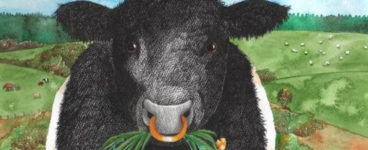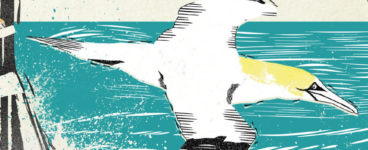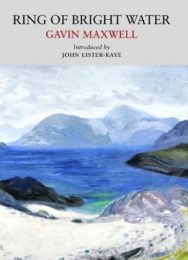‘Into this bright, watery landscape Mij moved and took possession with a delight that communicated itself as clearly as any articulate speech could have done,’
Renowned naturalist Gavin Maxwell may be better known for his time spent on the west coast of Scotland, but he is a son of Galloway, and learned his love of nature there. His most famous book, A Ring of Bright Water, is considered one of the pioneering texts in nature writing, and we are delighted to share an extract. Here, he shares the fledgling daily routine with his otter, Mij, who has travelled with him home, via London, from the Middle East.
Extract taken from A Ring of Bright Water
By Gavin Maxwell
Published by Little Toller Books
We arrived at Camusfeàrna in early June, soon after the beginning of a long spell of Mediterranean weather. My diary tells me that summerbegins on 22nd June, and under the heading for 24th June there is a somewhat furtive aside to the effect that it is Midsummer’s Day, as though to ward off the logical deduction that summer lasts only for four days in every year. But that summer at Camusfeàrna seemed to go on and on through timeless hours of sunshine and stillness and the dapple of changing cloud shadow upon the shoulders of the hills.
When I think of early summer at Camusfeàrna a single enduring image comes forward through the multitude that jostle in kaleidoscopic patterns before my mind’s eye – that of wild roses against a clear blue sea, so that when I remember that summer alone with my curious namesake who had travelled so far, those roses have become for me the symbol of a whole complex of peace. They are not the pale, anaemic flowers of the south, but a deep, intense pink that is almost a red; it is the only flower of that colour, and it is the only flower that one sees habitually against the direct background of the ocean, free from the green stain of summer. The yellow flag irises flowering in dense ranks about the burn and the foreshore, the wild orchids bright among the heather and mountain grasses, all these lack the essential contrast, for the eye may move from them to the sea beyond them only through the intermediary, as it were, of the varying greens among which they grow.
It is in June and October that the colours at Camusfeàrna run riot, but in June one must face seaward to escape the effect of wearing green-tinted spectacles. There at low tide the rich ochres, madders and oranges of the orderly strata of seaweed species are set against glaring, vibrant whites of barnacle-covered rock and shell sand, with always beyond them the elusive, changing blues and purples of the moving water, and somewhere in the foreground the wild roses of the north.
Into this bright, watery landscape Mij moved and took possession with a delight that communicated itself as clearly as any articulate speech could have done; his alien but essentially appropriate entity occupied and dominated every corner of it, so that he became for me the central figure among the host of wild creatures with which I was surrounded. The waterfall, the burn, the white beaches and the islands; his form became the familiar foreground to them all – or perhaps foreground is not the right word, for at Camusfeàrna he seemed so absolute a part ofhis surroundings that I wondered how they could ever have seemed to me complete before his arrival.
At the beginning, while I was still imbued with the caution and forethought that had so far gone to his tending, Mij’s daily life followed something of a routine; this became, as the weeks went on, relaxed into a total freedom at the centre point of which Camusfeàrna house remained Mij’s holt, the den to which he returned at night, and in the daytime when he was tired. But this emancipation, like most natural changes, took place so gradually and unobtrusively that it was difficult for me to say at what point the routine had stopped.
Mij slept in my bed (by now, as I have said, he had abandoned the teddy-bear attitude and lay on his back under the bedclothes with his whiskers tickling my ankles and his body at the crook of my knees) and would wake with bizarre punctuality at exactly twenty past eight in the morning. I have sought any possible explanation for this, and some ‘feed-back’ situation in which it was actually I who made the first unconscious movement, giving him his cue, cannot be altogether discounted; but whatever the reason, his waking time, then and until the end of his life, summer or winter, remained precisely twenty past eight. Having woken, he would come up to the pillow and nuzzle my face and neck with small attenuated squeaks of pleasure and affection. If I did not rouse myself very soon he would set about getting me out of bed. This he did with the business-like, slightly impatient efficiency of a nurse dealing with a difficult child. He played the game by certain defined and self-imposed rules; he would not, for example, use his teeth even to pinch, and inside these limitations it was hard to imagine how a human brain could, in the same body, have exceeded his ingenuity. He began by going under the bedclothes and moving rapidly up and down the bed with a high-hunching, caterpillar-like motion that gradually untucked the bedclothes from beneath the sides of the mattress; this achieved he would redouble his efforts at the foot of the bed, where the sheets and blankets had a firmer hold. When everything had been loosened up to his satisfaction he would flow off the bed on to the floor – except when running on dry land the only appropriate word for an otter’s movement is flowing; they pour themselves, as it were, in the direction of their objective – take the bedclothes between his teeth, and, with a series of violent tugs, begin to yank them down beside him. Eventually, for I do not wear pyjamas, I would be left quite naked on the undersheet, clutching the pillows rebelliously. But they, too, had to go; and it was here that he demonstrated the extraordinary strength concealed in his small body. He would work his way under them and execute a series of mighty hunches of his arched back, each of them lifting my head and whole shoulders clear of the bed, and at some point in the procedure he invariably contrived to dislodge the pillows while I was still in midair, much as a certain type of practical joker will remove a chair upon which someone is in the act of sitting down. Left thus comfortless and bereft both of covering and of dignity, there was little option but to dress, while Mij looked on with an all-that-shouldn’t-really-have-been-necessary-you-know sort of expression. Otters usually get their own way in the end; they are not dogs, and they co-exist with humans rather than being owned by them.
A Ring of Bright Water by Gavin Maxwell is published by Little Toller Books, priced £14.00
ALSO IN THIS ISSUE

 All Hail Curly Tale!
All Hail Curly Tale!
‘After all, without our fabulous rural landscapes there would be no stories to tell! ‘

 The Seafarers: A Journey Among Birds
The Seafarers: A Journey Among Birds
‘Seabirds love islands, as I love islands: the further out of the way they are, the less disturbance …













